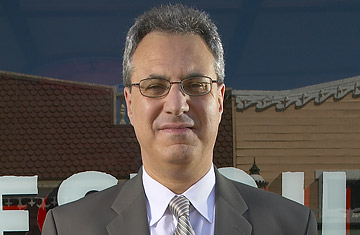In the pantheon of lost causes, defending the plastic grocery bag would seem to be right up there with supporting smoking on planes or the murder of puppies. The ubiquitous thin white bag has moved squarely beyond eyesore into the realm of public nuisance, a symbol of waste and excess and the incremental destruction of nature. But where there’s an industry at risk, there’s an attorney, and the plastic bag’s advocate in chief is Stephen L. Joseph, head of the quixotically titled Save the Plastic Bag campaign.
Recently, Joseph and his cause have taken a few hits. Last Tuesday, Los Angeles became the most recent American city to take a stand against the bag, when its city council voted unanimously to ban plastic in all supermarkets and retail stores by 2010 if a statewide fee on the bags has not been put in place by then. (It’s estimated that Los Angeles uses 2 billion plastic bags a year, only 5% of which are recycled.) Joseph had filed suit against Los Angeles County on the grounds that it did not prepare an Environmental Impact Report on the banning of the bags as required by California law.
A month earlier, Manhattan Beach, Calif., adopted a similar ordinance, also over Joseph’s objections and legal maneuvers. And last July, Joseph’s home city of San Francisco became the first American metropolis to impose the ban. (Joseph has been on the case only since June, so that’s not in his column.)
The former Washington lobbyist, who was born in England and reluctantly gives his age as 50-something, admits it’s an uphill battle trying to improve the image of a throwaway item that has been tied to everything from global warming to dependence on oil and the death of marine life. Especially in California. Particularly in ultra-liberal Marin County. It took him more than a year after the bag manufacturers came calling to take on the cause. “It’s very challenging to counter the myths and misinformation,” he says from his Tiburon, Calif., law offices. “I’m a one-man show.”
As a lawyer, he’s a pretty good publicist: in 2003 he sued Kraft Foods to prevent the sale of Oreo cookies to children under the age of 11 in California, on the grounds that they were full of trans fat. While he didn’t win the court battle, he clearly won the war; Governor Arnold Schwarzenegger signed an anti-trans-fat bill into law on July 25. Earlier, Joseph sued San Francisco’s parking department to get the agency to remove graffiti from its signs, and he was an anti-litter activist. Graffiti and litter — including, say, plastic shopping bags — live on, so he’s batting about .300.
How can a former anti-litter activist support plastic bags? Joseph points out, and some environmentalists agree, that in many ways paper bags are just as bad for the environment as plastic ones. While paper bags decompose, they also release methane while doing so. While plastic bags are sometimes made with petrochemicals, paper bags require more energy to be made and recycled. The evidence that plastic bags kill marine life is not conclusive, and it’s generally acknowledged that the detritus from commercial fishing is much more damaging. “My research into this issue has proved to me that something funny is going on,” says Joseph. “The anti-plastic-bag campaigners are not being challenged. It’s like a court case where nobody’s representing the other side.”
Against the use of cloth shopping bags, however, or the string type his grandmother might have taken to the high street, Joseph has fewer arguments. Plastic bags make handy trash-can liners, he says, or receptacles for cat litter. And, of course, they can be reused to hold shopping. “Do you know what I think is the best thing about them? You can shove about 12 of them in your glove compartment.”
However persuasive his arguments, Joseph’s task may be Canute-like. In June, China banned shops throughout the country from giving out free plastic bags and banned the production, sale and use of any plastic bags less than one-thousandth of an inch thick. Bhutan banned the bags on the grounds that they interfered with national happiness. Ireland has imposed a hefty 34-cent fee for each bag used. Both Uganda and Zanzibar have banned them, as have 30 villages in Alaska. Scores of countries have imposed or are considering similar measures.
Joseph labors on nevertheless, undaunted by the tide or by what his Marin County neighbors must think. “I’ve told a lot of people that I’m trying to save the plastic bag,” he says. “They look at me with horror.” But he says that no, he has not seen a drop-off in dinner-party invitations. “This is not an issue that belongs in the left bucket or the right bucket. It’s about truth. And I’m determined to make it register.”
Post time: Dec-06-2021


